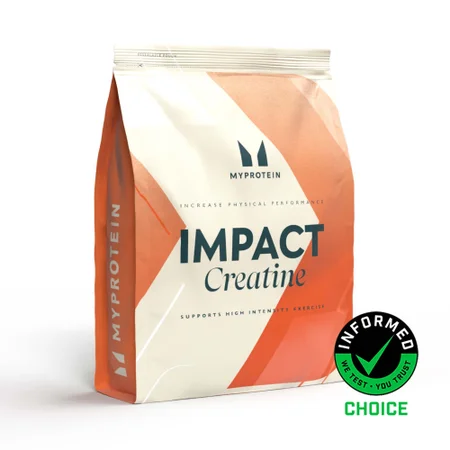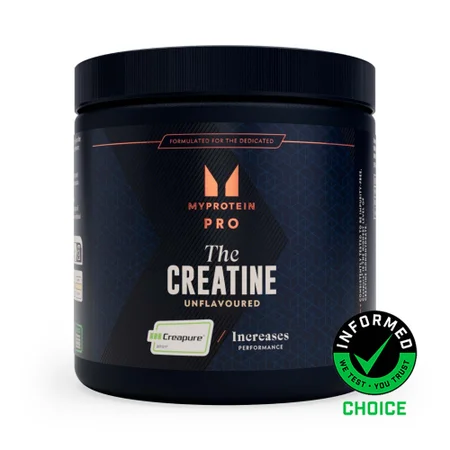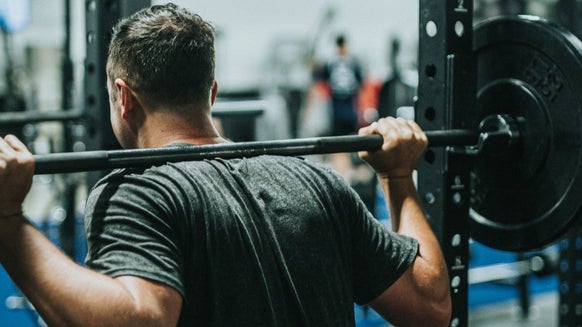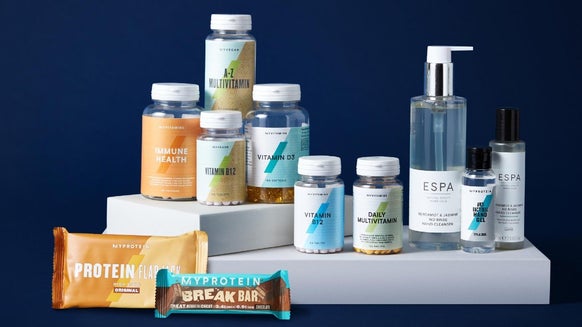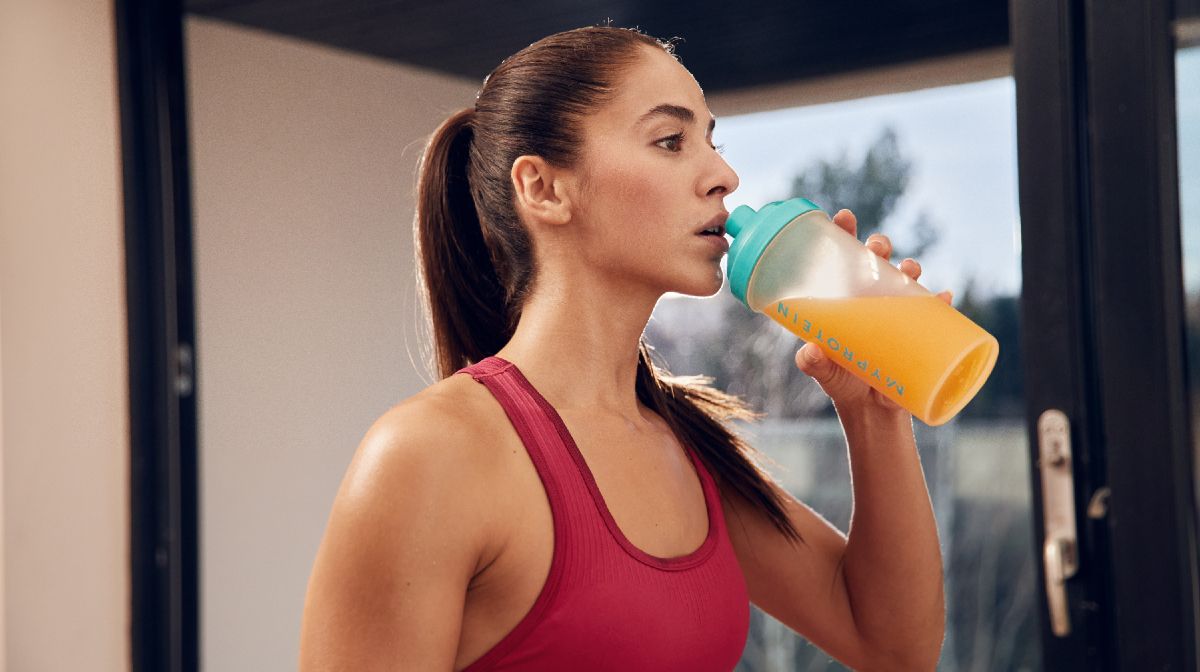
Creatine is a popular supplement used by athletes and gym goers with tonnes of evidence to back it as one of the most effective supplements for improving strength, speed, and muscle mass.1 However, one of the most prevalent side effects of creatine is weight gain.2 But this isn't necessarily a bad thing, or the kind of weight gain you might be thinking of.
In this article, we'll break down the facts and answer your questions surrounding weight gain caused by creatine, explaining what happens to your body composition when you supplement with it.
Jump to:
- What is creatine?
- How does creatine work?
- Does creatine help build lean muscle?
- Does creatine make you fat?
- Creatine and dieting
- Creatine and water retention
- Creatine for women

Get the low-down on what creatine actually does from our nutritionist here...
What is Creatine?
Creatine is a naturally occurring compound found in foods like red meat, poultry, and seafood.
It's made up of three separate amino acids: arginine, glycine, and methionine.
The body can produce creatine in the liver, kidneys and pancreas from these three amino acids, or you can consume it in supplement form.
An average 70kg male will typically store approximately 120g of creatine in their body.1
With supplementation, it's possible to increase this storage to around 160g, maximising the body's capacity.1
When your creatine storage is maximised, you'll see the performance-enhancing effects of increased strength, power, muscle mass, and improved recovery.1
How Does Creatine Work?
Creatine helps with explosive type movements that don’t require oxygen, otherwise known as anaerobic exercise.
It combines with another compound called phosphagen to result in PCr (phosphocreatine), which is stored in muscle cells.
PCr acts as an energy source during high-intensity exercise, such as weightlifting or sprinting.
ATP (adenosine triphosphate) is the main source of energy in the body, but it quickly gets used up during intense effort and is converted to a less useful molecule called ADP (adenosine diphosphate).
Creatine donates its phosphate group back to ADP, converting it back into the usable energy source, ATP.
Essentially, increasing your phosphocreatine storage allows you to hit more reps and recover better between sets, leading to increased gains in muscle mass over time.
Does Creatine Help Build Lean Muscle?
In the short term, the weight gained during creatine supplementation will not be lean muscle but water retention in the muscle cell.
The true training adaptations, leading to muscle growth, occur once your body’s creatine stores have been maximised.
Essentially, full creatine stores allow you to hit more reps and recover quicker, leading to long-term gains in lean muscle mass.
Teamed up with resistance training, those supplementing creatine will typically gain more muscle mass than those that don't.
Research suggests that this could be as much as 1.8kg after 12 weeks of training.1
The swelling of the muscle cell caused by water retention may also be one of the ways in which creatine increases lean muscle mass.3
It's believed that this swelling acts as a trigger which sets off a cascade of metabolic reactions, resulting in an increase of muscle protein synthesis and muscle growth.3
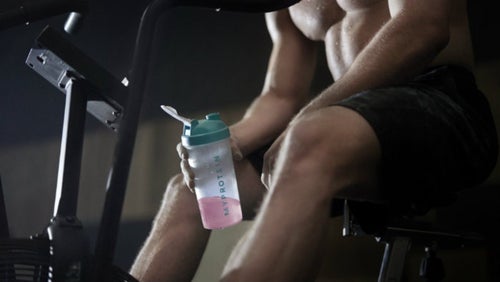
Is Creatine Right For You? | Quiz
Find out if you should be adding in some creatine to you supplement stack....
Does Creatine Make You Gain Weight?
Simply put, the short answer is: no, creatine won't make you gain fat.
In short-term studies, the evidence shows that creatine will increase body mass, especially if following a loading protocol.4
While you may notice an increase on the scale or feel heavier, this increase in body mass is due to water retention in the muscle cell, not fat accumulation.4
Creatine draws water towards the muscle cell, which is actually a good sign as it indicates your creatine stores are increasing, leading to performance benefits.4
In the long term, any further weight gain will be due to the increased exercise capacity that creatine provides, allowing you to train harder and ultimately build more lean muscle mass.1
Building more muscle from these types of movements might actually help burn fat in the long run, as muscle tissue is more metabolically active than fat tissue.1
Can Creatine Support Weight Loss?
While creatine does not directly burn fat, it can certainly help you to meet your body composition goals when trying to lose body fat.
It’s important to make it clear that when we talk about weight loss, losing body fat matters more than what the scales say.
If you're in a calorie deficit, creatine can be especially helpful:
- It helps you to maintain more power and explosivity at the gym.
- This can be especially helpful if you’re trying to lose weight and feeling sluggish on your calorie deficit.
- It helps reduce the loss of strength when dieting.
Better workouts and the addition of lean muscle can lead to more calories burned overall, supporting your fat loss efforts.
The only time you might consider stopping creatine is if you are a professional athlete literally trying to reduce the actual number on the scales to hit a specific weight, like in boxing or MMA.
Does Creatine Cause Bloating?
For creatine to produce phosphocreatine in skeletal muscle, it must enter the muscle cell via the bloodstream.5
As creatine enters the muscle cell, it may draw water into the cell, resulting in water retention and weight gain.4
This can lead to some users feeling that they look bloated after taking creatine for the first time.
This is called intracellular water retention, and while it may be a downside for some, it's actually a good thing for your muscles.
Muscles that are well-hydrated can recover more quickly and take longer to fatigue.1 - Bloating usually lessens a short time after consumption.
- If it's causing you trouble, you can try splitting your dose into two servings a day.
It's important to drink enough water when supplementing with creatine to help manage this water retention and keep your muscles hydrated.
Creatine for Women
Creatine is not solely for "super-jacked" bodybuilders. It offers significant benefits for women as well, including improved performance, muscle growth, and overall health.
Studies on female athletes found that creatine supplementation significantly increases lower-body strength without significant weight gain or bulking.
Another study found that creatine supplementation can increase upper-body strength while reducing body fat percentage.
Take Home Message
In the short term, creatine supplementation may increase total body weight. This is most likely due to water retention in the muscle rather than an increase in muscle or fat mass.
This increased water retention is actually a positive sign that your muscle cells are saturating with creatine, leading to improved performance.
Long-term creatine use alongside resistance training can lead to greater lean muscle mass gains due to increased training volume and recovery.
So, for whatever “water weight” gained, it’s probably worth it for the performance and muscle gains creatine makes in the long-term.

- Buford, T.W., Kreider, R.B., Stout, J.R. et al. International Society of Sports Nutrition position stand: creatine supplementation and exercise. J Int Soc Sports Nutr 4, 6 (2007). https://doi.org/10.1186/1550-2783-4-6
- Kreider, R.B., Kalman, D.S., Antonio, J. et al. International Society of Sports Nutrition position stand: safety and efficacy of creatine supplementation in exercise, sport, and medicine. J Int Soc Sports Nutr 14, 18 (2017).
- Kreider RB. Effects of creatine supplementation on performance and training adaptations. Mol Cell Biochem. 2003 Feb;244(1-2):89-94. PMID: 12701815.
- Guimarães-Ferreira L. Role of the phosphocreatine system on energetic homeostasis in skeletal and cardiac muscles. Einstein (Sao Paulo). 2014;12(1):126-131. doi:10.1590/s1679-45082014rb2741
- Powers ME, Arnold BL, Weltman AL, et al. Creatine Supplementation Increases Total Body Water Without Altering Fluid Distribution. J Athl Train. 2003;38(1):44-50.
